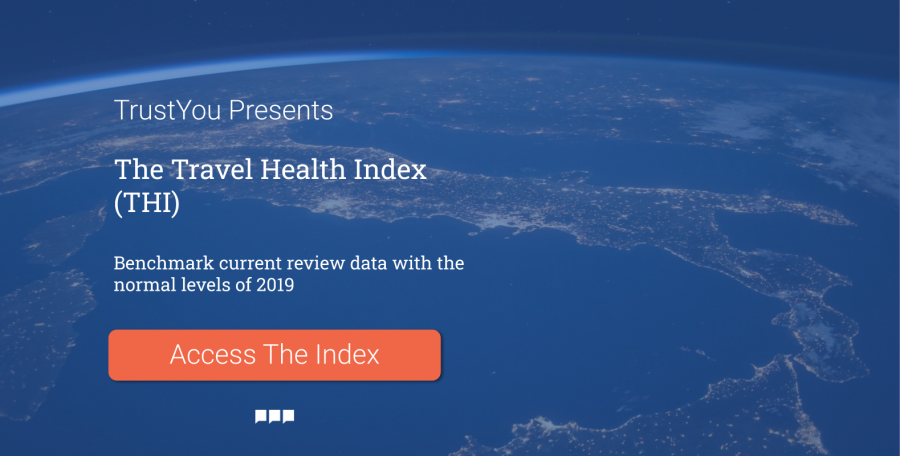Our “FAQ with an Expert” series continues and this time, we asked our VP of Marketing, Valerie Castillo, a few pressing questions about the current state of marketing within the travel and hospitality industry. As communication holds us together when times are tough, marketing departments from all over the world are facing unprecedented challenges, as well as unexpected opportunities.
While we all wait for the world to settle into a new normal and for business to pick up again, many marketing departments are giving 150% to keep communications running, to avoid significant loss of presence, and to prepare for recovery.
At TrustYou, our marketing team is focusing all efforts towards supporting our clients with the information, data, and resources they need. Keep reading our marketing expert’s insights on the most important strategies and learnings of the TrustYou marketing department during the COVID-19 crisis.
How has the current crisis affected the marketing team? What strategies are you using to stay ahead of the competition?
Like almost every other company out there, the crisis had quite an impact on our company as a whole but we’re determined to move forward and prepare for better times. What changed the most within the marketing team is that we basically had to throw our content plan out the window. We had everything in place for the first six months of the year and now we’re starting again almost from scratch. But we all agreed that this is what makes the most sense in the current situation and we wouldn’t want to push our own agenda while customers are facing serious changes and challenges. What matters most for us right now is to be able to support our clients and the industry and to help them get through the crisis. I think the fact that we focus our energy on understanding what customers need and then provide them with that is what gives us a natural edge over the competition.
What would you say is the current importance and relevance of marketing in the crisis management scene?
The same things that are important before a crisis are even more important during a crisis. We want to be relevant and important from both a brand and a product perspective. What we want to drive more attention to during this time is the fact that reputation management is not just “nice-to-have”, it’s a “must-have”. The only way for hoteliers to get through this crisis and go back to gaining bookings and revenue is by listening to their guests, even closer than before.
We want to keep our products and resources “sticky” so that customers want to hold on to them. The purpose of marketing during a crisis is to support customers with all the information and resources that are needed.
What is TrustYou Marketing’s vision and main priority during this period? When looking back on the crisis, what do you hope to have achieved?
When you work in marketing, you take on the responsibility to recognize change and adapt to it quickly. Marketing is uniquely positioned within a company to constantly adapt. It’s something that we do all the time – picking up on trends and market conditions and catering to the ever-changing travel and hospitality industries. A crisis like this just ensures that we do all this faster and better than we’ve ever done before. Personally, I hope that we’ve learned something from our adaptation. It would be a waste if we didn’t take the opportunity to reassess what we’re doing and change in a way that ensures we thrive when the crisis is over.
Which is the biggest challenge that the marketing team is facing in the coronavirus context?
Great marketing is often a combination of “right place, right time” and I think the greatest challenge is to understand what the “right time” will be for any of our campaigns. We are planners, we like to plan ahead and we like to have a schedule and stick to it. You show me a marketing team, and I’ll guarantee they have a campaign calendar. But when the pandemic hit, it was like the time started to melt away and it is not the same construct it once was.

Right now, it feels like we’re an army awaiting battle – we are well-prepared and ready to go to market, but we just aren’t sure when the siren will alarm.
What would you say is the most impactful resource or initiative that TrustYou has launched since the beginning of the crisis – and why?
As I mentioned before, when the crisis happened, we wanted to understand what our customers might need from us and also what we were uniquely qualified to give them. We knew we and many of our other competitors could create content, best practices, blogs with tips, etc. But we wanted to dig deeper than that. So we came up with the Travel Health Index, an exclusive KPI that we are able to provide as the world’s largest guest feedback platform, that assesses guest feedback trends on a global and per country basis. Our THI is a great way for hoteliers to benchmark curren review volume with the normal levels of 2019, in order to understand exactly how their region is currently impacted by the COVID-19 crisis. The Travel Health Index also tracks the changes week-over-week so that hoteliers can keep an eye out on the path to recovery of each country.

How has collaboration with other departments changed and with what goal? Are there any departments that you work with more closely now?
Definitely, I’ve seen more synergy between our customer-facing, product, and marketing departments than ever before. For the Travel Health Index, we relied heavily on our product team to get the data and interesting insights. For the content and campaigns, we’ve worked closely with our sales teams in each region to get a better pulse-check on the state of the market and how/when we should be reaching out to customers.
How do you perceive the future of travel and what marketing methods are you using to build trust?
The return to travel I think will be slow and steady. I think back to the beginning of all this, and I was naive enough at one point to think that one day I would turn on the TV and the news would tell me “it’s over – we can go back to normal”. But now I see that it isn’t going to look like an on-switch. There’s going to be phases of travel, and everything “after” the pandemic will look different than before.
The best way to build trust is with transparency. We are going to encourage our clients to be very transparent with their guests, and we are doing the same thing for our customers, too. We want to talk to them more, understand what they need, and be honest about what we can and cannot do for them.
How do you keep morale up within the team? Is there something you can look forward to?
There’s always so much more I could do here, and want to, but one small thing we’ve implemented is re-looking at how we report on success. My team has been very KPI-focused over the last few years, but our main KPIs were around leads and revenue. So while we see an understandable lull in these numbers, we went back to our reporting metrics to find new KPIs that could motivate and excite us.
For the THI, we looked at its viewership and conversion in our content marketing platform, PathFactory, to see that it was one of our most popular content pieces to date. We found that the THI had blown other content pieces out of the water, likely due to the timeliness and relevance. It really motivated our team to keep working hard, pivoting when new trends occur, and putting the customer first. It also helps that we have a team of self-driven individuals who genuinely like their work and want to help the company through these times of crisis.
What is a word of advice you would give to fellow marketers in terms of strategic crisis management?
One of the most popular sentiments I’ve heard during this time is “we’re in this together” and I think just like citizens of a country, or employees at a company, marketers across the globe are in this together. We are some of the most creative people in the world, and if we can listen and learn from each other, we can better adapt and change the future of our businesses. So take a pause and sign up for that educational webinar, or make a new LinkedIn connection, or just simply ask your best friend, Google, for advice. If you’re struggling, you’re not alone. Let’s find the answers we need together.
